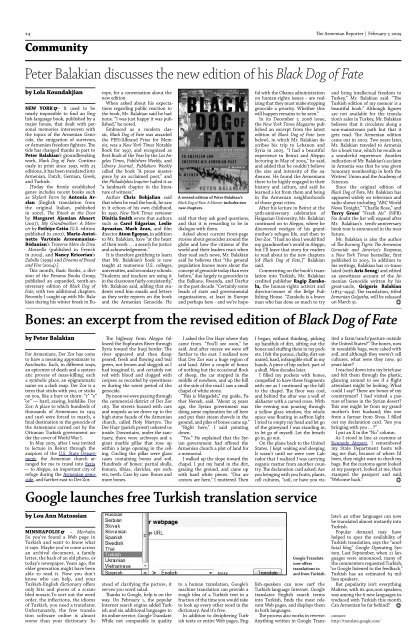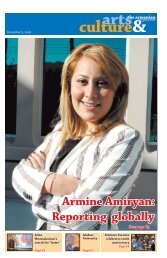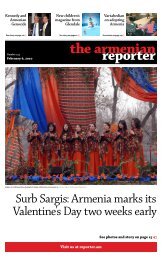National, International, Armenia, and Community News and Opinion
National, International, Armenia, and Community News and Opinion
National, International, Armenia, and Community News and Opinion
Create successful ePaper yourself
Turn your PDF publications into a flip-book with our unique Google optimized e-Paper software.
14 The <strong>Armenia</strong>n Reporter | February 7, 2009<br />
<strong>Community</strong><br />
Peter Balakian discusses the new edition of his Black Dog of Fate<br />
by Lola Koundakjian<br />
NEW YORK – It used to be<br />
nearly impossible to find an English-language<br />
book, published by a<br />
major house, that dealt with personal<br />
memories interwoven with<br />
the topics of the <strong>Armenia</strong>n Genocide,<br />
the emigration of survivors,<br />
or <strong>Armenia</strong>n freedom fighters. The<br />
tide has changed thanks in part to<br />
Peter Balakian ’s groundbreaking<br />
work, Black Dog of Fate. Continuously<br />
in print since 1997, with 23<br />
editions, it has been translated into<br />
<strong>Armenia</strong>n, Dutch, German, Greek,<br />
<strong>and</strong> Turkish.<br />
[Today the firmly established<br />
genre includes recent books such<br />
as Skylark Farm by Antonia Arslan<br />
(English translation from<br />
the original Italian, published<br />
in 2007), The Knock at the Door<br />
by Margaret Ajemian Ahnert<br />
(2007), My Gr<strong>and</strong>mother: A Memoir<br />
by Fethiye Cetin (U.S. edition<br />
published in 2007), Marie-Antoinette<br />
Varténie Arzoumanian-<br />
Bédanian ’s Traverse Mère de Dieu<br />
- Marseille (published in French<br />
in 2003), <strong>and</strong> Nancy Kricorian ’s<br />
Zabelle (1999) <strong>and</strong> Dreams of Bread<br />
<strong>and</strong> Fire (2004).]<br />
This month, Basic Books, a division<br />
of the Perseus Books Group,<br />
published an exp<strong>and</strong>ed, tenth-anniversary<br />
edition of Black Dog of<br />
Fate , with two additional chapters.<br />
Recently I caught up with Mr. Balakian<br />
during his winter break in Europe,<br />
for a conversation about the<br />
new edition.<br />
When asked about his expectations<br />
regarding public reaction to<br />
the book, Mr. Balakian said he had<br />
none. “I was just happy it was published,”<br />
he noted.<br />
Embraced as a modern classic,<br />
Black Dog of Fate was awarded<br />
the PEN/Albr<strong>and</strong> Prize for Memoir,<br />
was a New York Times Notable<br />
Book for 1997, <strong>and</strong> recognized as<br />
Best Book of the Year by the Los Angeles<br />
Times , Publishers Weekly, <strong>and</strong><br />
Library Journal . Publishers Weekly<br />
called the book “A prose masterpiece<br />
by an acclaimed poet,” <strong>and</strong><br />
the Philadelphia Inquirer hailed it as<br />
“a l<strong>and</strong>mark chapter in the literature<br />
of witness.”<br />
Author Chris Bohjalian said<br />
that when he read the book, he saw<br />
in it echoes of his own childhood.<br />
In 1997, New York Times reviewer<br />
Dinitia Smith wrote that authors<br />
such as Carol Edgarian , Leslie<br />
Ayvazian , Mark Arax, <strong>and</strong> film<br />
director Atom Egoyan , in addition<br />
to Mr. Balakian, have “at the heart<br />
of their work . . . a search for justice<br />
<strong>and</strong> acknowledgement.”<br />
It is therefore gratifying to learn<br />
that Mr. Balakian’s book is now<br />
taught at numerous U.S. colleges,<br />
universities, <strong>and</strong> secondary schools.<br />
“Students <strong>and</strong> teachers are using it<br />
in the classroom fairly consistently,”<br />
Mr. Balakian said, adding that students<br />
send him emails <strong>and</strong> letters<br />
as they write reports on the book<br />
<strong>and</strong> the <strong>Armenia</strong>n Genocide. He<br />
A revised edition of Peter Balakian’s<br />
Black Dog of Fate: A Memoir includes two<br />
new chapters.<br />
said that they ask good questions,<br />
<strong>and</strong> that it is rewarding to be in<br />
dialogue with them.<br />
Asked about current front-page<br />
stories about genocides around the<br />
globe <strong>and</strong> how the citizens of the<br />
world <strong>and</strong> their leaders react when<br />
they read such news, Mr. Balakian<br />
said he believes that “the general<br />
population knows more about the<br />
concept of genocide today than ever<br />
before,” due largely to genocides in<br />
the Balkans, Rw<strong>and</strong>a, <strong>and</strong> Darfur<br />
in the past decade. “Certainly some<br />
heads of state <strong>and</strong> governmental<br />
organizations, at least in Europe<br />
<strong>and</strong> perhaps here - <strong>and</strong> we’re hopeful<br />
with the Obama administration<br />
on human-rights issues - are realizing<br />
that they must make stopping<br />
genocide a priority. Whether this<br />
will happen remains to be seen.”<br />
In its December 7, 2008 issue,<br />
the New York Times Magazine published<br />
an excerpt from the latest<br />
edition of Black Dog of Fate (see<br />
below), in which Mr. Balakian describes<br />
his trip to Lebanon <strong>and</strong><br />
Syria in 2005. “I had a beautiful<br />
experience in Beirut <strong>and</strong> Aleppo<br />
lecturing in May of 2005,” he said,<br />
<strong>and</strong> added that he couldn’t believe<br />
the size <strong>and</strong> intensity of the audiences.<br />
He found the <strong>Armenia</strong>ns<br />
there to be highly engaged in their<br />
history <strong>and</strong> culture, <strong>and</strong> said he<br />
learned a lot from them <strong>and</strong> being<br />
in the <strong>Armenia</strong>n neighborhoods<br />
of those great cities.<br />
After his lecture in Beirut at the<br />
50th-anniversary celebration of<br />
Haigazian University, Mr. Balakian<br />
continued on to Aleppo, where he<br />
discovered vestiges of his gr<strong>and</strong>mother’s<br />
refugee life, <strong>and</strong> then to<br />
Der-Zor. “I had no idea I would find<br />
my gr<strong>and</strong>mother’s world in Aleppo,<br />
but I’ll leave that story for readers<br />
to read about in the new chapters<br />
[of Black Dog of Fate ,]” Balakian<br />
said.<br />
Commenting on the book’s translation<br />
into Turkish, Mr. Balakian<br />
credited publisher Ragip Zarakolu,<br />
the human-rights activist <strong>and</strong><br />
director/owner of the Belge Publishing<br />
House. “Zarakolu is a brave<br />
man who has done so much to try<br />
<strong>and</strong> bring intellectual freedom to<br />
Turkey,” Mr. Balakian said. “The<br />
Turkish edition of my memoir is a<br />
beautiful book.” Although figures<br />
are not available for the translation’s<br />
sales in Turkey, Mr. Balakian<br />
believes that it circulates along a<br />
non-mainstream path but that it<br />
gets read. The <strong>Armenia</strong>n edition<br />
came out in 2002. Two years later,<br />
Mr. Balakian traveled to <strong>Armenia</strong><br />
for a book tour, which he recalls as<br />
a wonderful experience. Another<br />
indication of Mr. Balakian’s acclaim<br />
in <strong>Armenia</strong> was that he was given<br />
honorary membership in both the<br />
Writers’ Union <strong>and</strong> the Academy of<br />
Sciences.<br />
Since the original edition of<br />
Black Dog of Fate , Mr. Balakian has<br />
appeared widely on television <strong>and</strong><br />
radio shows including “ABC World<br />
<strong>News</strong> Tonight,” “Charlie Rose,” <strong>and</strong><br />
Terry Gross ’ “Fresh Air” (NPR).<br />
No doubt the list will exp<strong>and</strong> after<br />
Mr. Balakian’s tenth-anniversary<br />
book tour is announced in the near<br />
future.<br />
Mr. Balakian is also the author<br />
of The Burning Tigris: The <strong>Armenia</strong>n<br />
Genocide <strong>and</strong> America’s Response,<br />
a New York Times bestseller, first<br />
published in 2003. In addition to<br />
his writings, Balakian has co-translated<br />
(with Aris Sevag ) <strong>and</strong> edited<br />
an eyewitness account of the <strong>Armenia</strong>n<br />
Genocide written by his<br />
great-uncle, Grigoris Balakian<br />
(1873–1934). The translation, titled<br />
<strong>Armenia</strong>n Golgotha, will be released<br />
on March 31.<br />
<br />
Bones: an excerpt from the revised edition of Black Dog of Fate<br />
by Peter Balakian<br />
For <strong>Armenia</strong>ns, Der Zor has come<br />
to have a meaning approximate to<br />
Auschwitz. Each, in different ways,<br />
an epicenter of death <strong>and</strong> a systematic<br />
process of mass-killing; each<br />
a symbolic place, an epigrammatic<br />
name on a dark map. Der Zor is a<br />
term that sticks with you, or sticks<br />
on you, like a burr or thorn: “r” “z”<br />
“or” — hard, sawing, knifelike. Der<br />
Zor: A place to which hundreds of<br />
thous<strong>and</strong>s of <strong>Armenia</strong>ns in 1915<br />
<strong>and</strong> 1916 were forced to march, a<br />
final destination in the genocide of<br />
the <strong>Armenia</strong>ns carried out by the<br />
Ottoman Turkish government under<br />
the cover of World War I.<br />
In May 2005, after I was invited<br />
to lecture in Beirut through the<br />
auspices of the U.S. State Department,<br />
the <strong>Armenia</strong>n church arranged<br />
for me to travel into Syria<br />
— to Aleppo, an important city of<br />
refuge during the <strong>Armenia</strong>n genocide,<br />
<strong>and</strong> farther east to Der Zor.<br />
The highway from Aleppo followed<br />
the Euphrates River through<br />
Syria toward the Iraqi border. The<br />
river appeared <strong>and</strong> then disappeared,<br />
fresh <strong>and</strong> flowing <strong>and</strong> teal<br />
green, not brown <strong>and</strong> sluggish as I<br />
had imagined it, <strong>and</strong> certainly not<br />
red with blood <strong>and</strong> clogged with<br />
corpses as recorded by eyewitnesses<br />
during the worst period of the<br />
genocide.<br />
By noon we were passing through<br />
the commercial district of Der Zor<br />
city. The streets buzzed with cars<br />
<strong>and</strong> mopeds as we drove up to the<br />
high stone facade of the <strong>Armenia</strong>n<br />
church, called Holy Martyrs. The<br />
Der Hayr (parish priest) ushered us<br />
inside. Downstairs, under the sanctuary,<br />
there were archways <strong>and</strong> a<br />
giant marble pillar that rose up<br />
within a large opening in the ceiling.<br />
Circling the pillar were glass<br />
cases containing bones <strong>and</strong> soil.<br />
Hundreds of bones: partial skulls,<br />
femurs, tibias, clavicles, eye sockets,<br />
teeth. Case by case. Bones <strong>and</strong><br />
more bones.<br />
I asked the Der Hayr where they<br />
came from. “You’ll see soon,” he<br />
said. And after mezze we were off<br />
farther to the east. I realized now<br />
that Der Zor was a huge region of<br />
arid l<strong>and</strong>. After a couple of hours<br />
of nothing but the occasional flock<br />
of sheep, the car stopped in the<br />
middle of nowhere, <strong>and</strong> up the hill<br />
at the side of the road I saw a small<br />
chapel of white stone.<br />
“This is Margadeh,” my guide, Father<br />
Nerseh, said. “About 15 years<br />
ago, the Syrian government was<br />
doing some exploration for oil here<br />
<strong>and</strong> put their steam shovels in the<br />
ground, <strong>and</strong> piles of bones came up.”<br />
“Right here,” I said pointing<br />
down.<br />
“Yes.” He explained that the Syrian<br />
government had offered the<br />
<strong>Armenia</strong>n church a plot of l<strong>and</strong> for<br />
a memorial.<br />
I walked up the slope toward the<br />
chapel. I put my h<strong>and</strong> in the dirt,<br />
grazing the ground, <strong>and</strong> came up<br />
with hard white pieces. “Our ancestors<br />
are here,” I muttered. Then<br />
Google launches free Turkish translation service<br />
I began, without thinking, picking<br />
up h<strong>and</strong>fuls of dirt, sifting out the<br />
bones <strong>and</strong> stuffing them in my pockets.<br />
I felt the porous, chalky, dirt-saturated,<br />
hard, infrangible stuff in my<br />
h<strong>and</strong>s. A piece of hip socket, part of<br />
a skull. Nine decades later.<br />
I filled my pockets with bones,<br />
compelled to have these fragments<br />
with me as I continued up the hill<br />
to the chapel. The floor was cool,<br />
<strong>and</strong> behind the altar was a wall of<br />
alabaster with a carved cross. With<br />
the evening sun pouring through<br />
a yellow glass window, the whole<br />
space was floating in saffron light.<br />
I tried to empty my head <strong>and</strong> let go<br />
of the graveyard I was st<strong>and</strong>ing in,<br />
to let go of myself. Let the breath<br />
go in, go out.<br />
On the plane back to the United<br />
States, I kept waking <strong>and</strong> sleeping.<br />
It wasn’t until we were over Labrador<br />
that I realized I was carrying<br />
organic matter from another country.<br />
The declaration card asked: Are<br />
you bringing with you fruits, plants,<br />
cell cultures, “soil, or have you visited<br />
a farm/ranch/pasture outside<br />
the United States” The bones, now<br />
in resealable bags, were caked with<br />
soil, <strong>and</strong> although they weren’t cell<br />
cultures, what were they now, 90<br />
years later<br />
I reached down into my briefcase<br />
<strong>and</strong> felt them through the plastic,<br />
glancing around to see if a flight<br />
attendant might be looking. What<br />
could I say These are bones of my<br />
countrymen I had visited a pasture<br />
of bones in the Syrian desert<br />
This one might be from my gr<strong>and</strong>mother’s<br />
first husb<strong>and</strong>; this one<br />
from a farmer from Sivas. I filled<br />
out my declaration card. “Are you<br />
bringing with you … ”<br />
I put an X in the “No” column.<br />
As I stood in line at customs at<br />
Kennedy Airport, I remembered<br />
my State Department hosts telling<br />
me that, because of where I’d<br />
been, they might want to check my<br />
bags. But the customs agent looked<br />
at my passport, looked at me, then<br />
stamped the passport <strong>and</strong> said,<br />
“Welcome back.”<br />
<br />
by Lou Ann Matossian<br />
MINNEAPOLIS – Merhaba.<br />
So you’ve found a Web page in<br />
Turkish <strong>and</strong> want to know what<br />
it says. Maybe you’ve come across<br />
an archival document, a family<br />
letter, the back of an old photo, or<br />
today’s newspaper. Years ago, the<br />
elder generation might have been<br />
able to read it. Now you don’t<br />
know who can help, <strong>and</strong> your<br />
Turkish-English dictionary offers<br />
only bits <strong>and</strong> pieces of a scrambled<br />
mosaic. To sort out the word<br />
order, the inflections, the idioms<br />
of Turkish, you need a translator.<br />
Unfortunately, the free translation<br />
software online is almost<br />
worse than your dictionary. Instead<br />
of clarifying the picture, it<br />
serves you word salad.<br />
Thanks to Google, help is on the<br />
way. On February 1, the popular<br />
Internet search engine added Turkish<br />
<strong>and</strong> six additional languages to<br />
its online service, Google Translate.<br />
While not comparable in quality<br />
Google Translate<br />
now offers<br />
translations to<br />
<strong>and</strong> from Turkish.<br />
to a human translation, Google’s<br />
machine translation can provide a<br />
rough idea of a Turkish text in a<br />
fraction of the time you would take<br />
to look up every other word in the<br />
dictionary. And it’s free.<br />
In addition to deciphering Turkish<br />
texts or entire Web pages, English-speakers<br />
can now surf the<br />
Turkish-language Internet. Google<br />
translates English search terms<br />
into Turkish, finds the most relevant<br />
Web pages, <strong>and</strong> displays them<br />
in both languages.<br />
The process also works in reverse.<br />
Anything written in Google Translate’s<br />
40 other languages can now<br />
be translated almost instantly into<br />
Turkish.<br />
Popular dem<strong>and</strong> may have<br />
helped to spur the availability of<br />
Turkish translation, says the “unofficial<br />
blog” Google Operating System.<br />
Last September, when 11 languages<br />
were announced, many of<br />
the commenters requested Turkish,<br />
“so Google listened to the feedback.”<br />
Turkish has an estimated 63 million<br />
speakers.<br />
But popularity isn’t everything.<br />
Maltese, with its 400,000 speakers,<br />
was among the 6 new languages introduced<br />
with Turkish this month.<br />
Can <strong>Armenia</strong>n be far behind <br />
connect:<br />
http://translate.google.com/

















